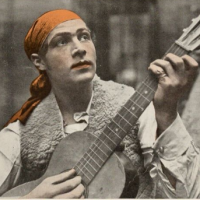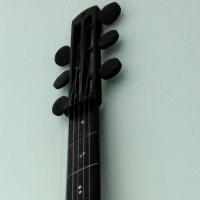DjangoBooks.com
Welcome to our Community!
Categories
- 20K All Categories
- 1.1K General
- 485 Welcome
- 60 Archtop Eddy's Corner
- 147 CD, DVD, and Concert Reviews
- 385 FAQ
- 26 Gypsy Jazz Italia
- 27 Photos
- 209 Gypsy Picking
- 21 Unaccompanied Django
- 15 Pearl Django Play-Along Vol.1
- 17 Gypsy Fire
- 45 Gypsy Rhythm
- 1.4K Gypsy Jazz University - Get Educated
- 131 Gypsy Jazz 101
- 231 Repertoire
- 229 History
- 709 Technique
- 51 Licks and Patterns
- 6 Daniel Givone Manouche Guitare Method Users Group
- 20 Eddie Lang Club
- 1.3K Gypsy Jazz Gear
- 816 Guitars, Strings, Picks, Amps, Pickups and Other Accessories
- 465 Classifieds
- 52 Recording
- 64 Other Instruments
- 18 Violin
- 5 Mandolin
- 23 Accordion
- 7 Bass
- 11 Woodwinds
- 352 Gypsy Jazz Events
- 145 North America
- 112 Europe
- 95 International
In this Discussion
Who's Online (0)
Transcription: Licks vs Solos
Hi folks,
This question is a variation of previous discussions I'm seeing in my search. With this post, I am narrowing the question a bit.
Yesterday, I was chatting with some pals about their approach to transcription. A couple of us mainly transcribe licks and a couple focus on whole solos. I am in the solos camp, but will probably switch to the lick camp. They are not mutually exclusive, of course.
Solos are like taking a class in which you walk away with a bunch of related licks that you must break out and practice individually. The lick approach seems more efficient. You like a lick or find a lick that fits over certain chords and then practice that over similar changes in other tunes. I find that I get bogged down learning solos, perhaps when running into particularly funky Django fingerings or his licks that don't readily make sense to me. With Solos, it feels like I am taking a class in a tune. I learn a bunch of usable licks along with other not useable licks and then I have to allocate time to break those out in a systematic way to make use of them. In theory, I would be analyzing how they are all put together in the solo. But, I don't really have time for that with all those licks to make use of. Mentally, transcribing a solo creates a set of useful and non-useful things categorized a larger thing (the solo).
Even reading my own thoughts here, I am realizing... licks it is for the time being.
That's my take. I want to hear what others do and why in terms of advantages and disadvantages. Thoughts?
Jonathan












Comments
Good question. I think each had their own merits and you will likely hear fierce defenders of their own opinion being the right one. I learned licks, then went to solos, and now learn licks mainly for ear training.
Licks were the initial way in which I got into the style. My ear, vision of the neck, and vocabulary was not anywhere in the style. Denis's first videos got me on the path and then I tried learning stuff myself. I played these licks as is and in the more popular keys in GJ. I shoehorned them into as many songs as I could.
I was convinced by non-GJ players to learn more by ear and got into the habit of transcribing a chorus. I'd then take out what I found interesting and manipulated. So if I learned a chorus of a django solo, I might find five or six different ideas. I'd figure out why they work and transcribe them into every key. I'd also try different fingerings that worked with the rest stroke style picking. I found this to be very fruitful as I could pick and choose a chorus of a solo for the same song, different players to see how they did it.
Now, I basically put on a recording, do an in the moment transcription. If I like it, I work it out in all keys and keep it going for a few days or until something new and shiny comes along. I try to learn any new head and harmony by ear too. That is time well spent.
Great stuff. I think your approach is "the way", if there is one.
I do both licks and solos, depending on the music. What I try to take away is a few things:
* The way the musician approaches the fretboard (assuming it's a guitarist) — often I've discovered new shapes/patterns by transcribing
* The phrasing — the shape of a line of music, where it starts, where it ends, the rhythmic feel, where it's accented, etc.
* The colors — note choice, the effect of certain notes over certain chords
This is pretty general stuff as opposed to "hard-coding" specific licks. Learning specific licks can of course be useful, but it leads to a kind of copy-and-paste-style playing that isn't what I want to do with my life.
Once you've done it enough, some of this work can be done more passively, without an instrument, just by doing active listening.
Adrian
Hi Adrian, thanks for chiming in. You highlight the musical elements (fretboard mastery, phrasing, color) as opposed to merely practice techniques. I like your focus on making it your own, so to speak. I vibe with your approach. But, I find this a tricky point for me in my musical path. I studied a more generic jazz approach prior to going whole hog Gypsy style. I find that less young (ahem) fellows like myself who have studied jazz previously have unique challenges when taking on the style.
Previously, I was trying to compose on the spot, trying to discover things as they came through my fingers... no licks. I continue doing that now some, but realize more and more over the years that I have to have a certain amount of licks in pocket. When I am composing/thinking on the spot, it can be great when I am on. But, after playing a while or tired or had a couple beers or whatever, I can fall apart soloing.
In addition, I've been transcribing more solos than licks, thinking that the style would sort of seep in, which it does. But, I'm thinking I need to do straight licks for a while to reinforce my foundation.
I heard so many times from world class guitar players that they used to learn tons of solos when they were still developing their own style and skills. But I've never heard any of them say that they did anything further than that. So did they or did they not dissect, analyze etc...I tend to think for the most part they didn't.
I started writing the above last night and left it percolate overnight when I opened the page this morning and saw Adrian post. He wrote it up perfectly where I was kinda heading. Because I felt like this learning a bunch of solos for these players was more of a passive approach with benefits coming from this exactly as he laid out above.
I've always done or tried to do whole solos and wasted a lot of time. The point for me now is to figure out how to play cool stuff on my own, and then transcription has to be on a micro micro level. Learning a whole solo to me is just way too much information to really examine in depth. I never understood that before.
I guess it also depends on the solo, I learned the Lester Young Lady Be Good solo all the way through and that was helpful, it's also fairly simple relatively. But even then I feel like I didn't pull everything I could out of it. I definitely can't play it in multiple keys.
I've been working on one Stan Getz blues like for a couple of weeks and there's so much in it. I think it's 5 seconds long or thereabouts. There's cool leading tone stuff, chromaticism, kind of anarchistic blues timing and feel. It's so great...if I was pushing myself to learn the whole solo I would be glossing over my understanding of it.
(Bronx Blues - Stan Getz and Oscar Peterson, first lick Stan plays....total heaven).
this is an interesting take:
http://davidliebman.com/home/ed_articles/the-complete-transcription-process/
It all makes sense. That's why this question is impossible to answer. You go where your instincts take you. Even if there's a better way it's still a whole lot better than doing nothing.
I also don't want to copy and paste but some is ok. The way I largely avoid quoting verbatim is by transcribing until it's good enough. What I mean is when I hear some phrase I like a lot, usually it's because there's an interval that stands out. So I make sure I get that right. That's the juice concentrate, the rest is a filler to make up the volume and I don't worry about getting it exactly as I heard it. I just make sure the phrasing is there for the most part and it fits the current chord grouping.
Ok, heading down a rabbit hole post...
Generally I consider learning whole solo's a lot of wasted time. Yes you will get stuff out of it but it is not efficient as there will be a lot in an entire solo you will not use. That said I have learned entire chorus's of Django solos just to be able to play them on occasion in a show or a jam. As far as licks, once they are integrated they can start become your own. In GJ almost every player plays some of the same licks that are in the GJ vernacular. Chrisitiaan's book has the basics of many of those licks. There are many variations of those licks which people play but that is a good source for the basics. Unlike other jazz genre's I have seen, there are licks or variations of phrases you have to know to advance in this genre . I usually listen an analyze a solo or part of a solo daily and if it sounds like GJ it is often contains some variation of said licks above. I personally like taking licks and break them down to even smaller segments. from there it is easier to move things around. I have been developing a system to just deal with segments which I posted a while back. This gives a freedom to improvise w/o getting caught up in longer licks.
When it comes to other genres of jazz, that is open ended as there are so many different players with different approaches so that's all I'll touch on that here. The good thing or bad, depending on how you wish to look at it is GJ has certain lines that one should learn to sound somewhat authentic. The choice to do that or or incorporate other influences is of course a personal decision.
www.scoredog.tv
Oh, hey, it's Jonathan from CCQ!! My take on a couple of benefits of transcribing an entire solo, or at least an entire chorus (though my intent isn't to play them note for note on a gig/jam).
I also personally find it only natural to learn entire Django solos (and only certain songs). If I'm watching a live Moignard video, or even him ripping 4-5 chorus on a DC music school lesson...who's going to learn that entire thing? But if he plays something catchy, totally worth trying to analyze, pull, and apply. Jimmy obviously is quoting the entire Django solo here at :30, because the whole thing is so catchy and tells a story almost. I think there a plenty of other instances of Django solos that are worth learning in entirety like this.